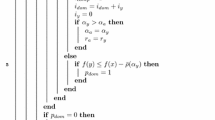Abstract
In many global optimization problems motivated by engineering applications, the number of function evaluations is severely limited by time or cost. To ensure that each evaluation contributes to the localization of good candidates for the role of global minimizer, a sequential choice of evaluation points is usually carried out. In particular, when Kriging is used to interpolate past evaluations, the uncertainty associated with the lack of information on the function can be expressed and used to compute a number of criteria accounting for the interest of an additional evaluation at any given point. This paper introduces minimizers entropy as a new Kriging-based criterion for the sequential choice of points at which the function should be evaluated. Based on stepwise uncertainty reduction, it accounts for the informational gain on the minimizer expected from a new evaluation. The criterion is approximated using conditional simulations of the Gaussian process model behind Kriging, and then inserted into an algorithm similar in spirit to the Efficient Global Optimization (EGO) algorithm. An empirical comparison is carried out between our criterion and expected improvement, one of the reference criteria in the literature. Experimental results indicate major evaluation savings over EGO. Finally, the method, which we call IAGO (for Informational Approach to Global Optimization), is extended to robust optimization problems, where both the factors to be tuned and the function evaluations are corrupted by noise.
Similar content being viewed by others
References
Abrahamsen, P.: A review of Gaussian random fields and correlation functions. Tech. Rep., Norwegian Computing Center (1997). www.math.ntnu.no/~omre/TMA4250/V2007/abrahamsen2.ps
Adler R.: On excursion sets, tubes formulas and maxima of random fields. Ann. Appl. Prob. 10(1), 1–74 (2000)
Chib S., Greenberg E.: Understanding the metropolis-hastings algorithm. Am. Stat. 49(4), 327–335 (1995)
Chilès J., Delfiner P.: Geostatistics, Modeling Spatial Uncertainty. Wiley, New York (1999)
Cover T.M., Thomas A.J.: Elements of Information Theory. Wiley, New York (1991)
Cox, D., John, S.: Sdo: a statistical method for global optimization. In: Alexandrov, N., Hussaini, M.Y. (eds.) Multidisciplinary Design Optimization: State of the Art, pp. 315–329. SIAM, Philadelphia (1997). citeseer.ifi.unizh.ch/cox97sdo.html
Delfiner, P.: Shift invariance under linear models. Ph.D. thesis, Princetown University, New Jersey (1977)
Dixon, L., Szegö, G.: The global optimisation problem: an introduction. In: Dixon, L., Szegö, G. (eds.) Towards Global Optimization 2. North-Holland Publishing Company (1978)
Geman, D., Jedynak, B.: An active testing model for tracking roads in satellite images. Tech. Rep. 2757, Institut National de Recherche en Informatique et en Automatique (INRIA) (1995)
Gutmann H.: A radial basis function method for global optimization. J. Glob. Optim. 19(3), 201–227 (2001)
Huang, D.: Experimental planning and sequential Kriging optimization using variable fidelity data. Ph.D. thesis, Ohio State University (2005)
Huang D., Allen T., Notz W., Zeng N.: Global optimization of stochastic black-box systems via sequential Kriging meta-models. J. Glob. Optim. 34, 441–466 (2006)
Jones D.: A taxonomy of global optimization methods based on response surfaces. J.Glob. Optim. 21, 345–383 (2001)
Jones D., Schonlau M., William J.: Efficient global optimization of expensive black-box functions. J. Glob. Optim. 13, 455–492 (1998)
Matheron G.: Principles of geostatistics. Econ. Geol. 58, 1246–1266 (1963)
Matheron, G.: Le krigeage universel. In: Cahiers du Centre de Morphologie Mathématique de Fontainebleau. Ecole des Mines de Paris (1969) Fasc.1
Sasena M., Papalambros P., Goovaerts P.: Exploration of metamodeling sampling criteria for constrained global optimization. Eng. Opt. 34, 263–278 (2002)
Schonlau, M.: Computer experiments and global optimization. Ph.D. thesis, University of Waterloo (1997)
Sjö, E.: Crossings and maxima in Gaussian fields and seas. Ph.D. thesis, Lund Institute of Technology (2000)
Smola, A.: Learning with kernels. Ph.D. thesis, Technische Universität Berlin (1998)
Stein M.: Interpolation of Spatial Data: Some Theory for Kriging. Springer, New York (1999)
Vechia A.: Estimation and model identification for continuous spatial processes. J. R. Stat. Soc. B(50), 297–312 (1998)
Wahba G.: Support vector machines, reproducing kernel Hilbert spaces, and randomized GACV. In: Schölkopf, B., Burges, C., Smola, A. (eds) Advances in Kernel Methods—Support Vector Learning, pp. 69–87. MIT Press, Boston (1998)
Watson A., Barnes R.: Infill sampling criteria to locate extremes. Math. Geol. 27(5), 589–698 (1995)
Williams, C., Rasmussen, C.: Gaussian processes for regression. In: Touretzky, D., Mayer, M., Hasselmo, M. (eds.) Advances in Neural Information Processing Systems, vol. 8. MIT Press (1996)
Williams B., Santner T., Notz W.: Sequential design of computer experiments to minimize integrated response functions. Stat. Sinica 10, 1133–1152 (2000)
Yaglom A.: Correlation Theory of Stationary and Related Random Functions I: Basic Results. Vol. 6, Springer Series in Statistics. Springer-Verlag, New-York (1986)
Author information
Authors and Affiliations
Corresponding author
Rights and permissions
About this article
Cite this article
Villemonteix, J., Vazquez, E. & Walter, E. An informational approach to the global optimization of expensive-to-evaluate functions. J Glob Optim 44, 509–534 (2009). https://doi.org/10.1007/s10898-008-9354-2
Received:
Accepted:
Published:
Issue Date:
DOI: https://doi.org/10.1007/s10898-008-9354-2




